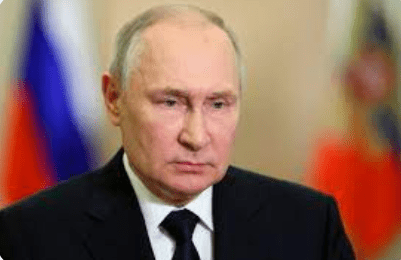Russia’s election commission praised the “unprecedented” results for President Vladimir Putin, ensuring him a fifth term in office without any significant opposition.
The Kremlin has portrayed the recent election as evidence of Russian support for Putin's actions in Ukraine, despite ballot interference and Ukrainian attacks on border areas.
Putin’s win, which was expected, sets him on track to become the longest-serving Russian leader in over two centuries.
All of Putin’s main rivals are deceased, imprisoned, or in exile, and the voting occurred a month after his top challenger, Alexei Navalny, died in custody.
Kremlin-friendly election chief Ella Pamfilova stated, “Almost 76 million people” voted for Putin, marking a record number.
Putin has led Russia into separation from the West by initiating the 2022 Ukraine campaign.
“Against the West, we stand united,” Pamfilova said.
During a victory speech on Sunday night, Putin pledged that Moscow would resist external pressure.
“No matter who tries to intimidate or suppress us, our will and consciousness have never been subdued by anyone in history,
and it didn’t happen now and won’t happen in the future. Never,” he declared.
Measures to be taken against ballot interference
In power since the end of 1999, Putin has cultivated an image of a strong leader, claiming to protect Moscow’s national identity from perceived threats.
His actions in Ukraine have been accompanied by a significant crackdown at home, resulting in a notable increase in political prisoners in Russia.
In response to the opposition's call to protest the election, thousands formed long queues at polling stations inside and outside Russia.
Additionally, ballots were spoiled with green dye, and voting booths were set on fire in several incidents.
Putin asserted that Russians who spoiled their ballots “have to be dealt with” and dismissed opposition protests as ineffective.
He stated that the vote demonstrated the Russian people's “trust” in him.
The three-day vote, which also took place in Russian-occupied parts of Ukraine, witnessed a surge in deadly Ukrainian attacks on Russian border areas.
Officials reported that Ukrainian attacks resulted in the deaths of 11 individuals in Russia’s Belgorod region in the past week.
China and North Korea extend congratulations to Putin
While Western leaders congratulated Putin on his previous four election victories since 2000, this time his win was met with harsh criticism.
UK Foreign Minister David Cameron remarked, “This is not what free and fair elections look like.”
In Ukraine, facing Russian forces, President Volodymyr Zelensky condemned Putin as a “dictator” intoxicated by power.
However, other countries, including China, North Korea, Venezuela and Myanmar, sent their congratulations.
Russia has expressed its desire for new alliances following the breakdown of relations with the West over Ukraine.
Putin confirmed on Sunday night that Moscow aims to strengthen ties with its Chinese neighbor in particular.
He said our relationship is steady and they complete each other. The most important thing is that the interests of the state match.
Putin says Navalny’s name
In Berlin, which has a large community of Russian emigrants, Yulia Navalnaya stood in line outside Moscow’s embassy at noon. She mentioned she wrote her late husband’s name on the ballot.
“I definitely wrote Navalny’s name,” the 47-year-old, who has promised to continue her husband’s work, told a supportive crowd.
Throughout his rule, Putin has not accepted real opposition and for about ten years, he refused to publicly say the name of his main competitor: Alexei Navalny.
He broke that tradition on Sunday, saying his name as he acknowledged his challenger’s death for the first time.
“As for Mr. Navalny. Yes, he passed away. This is always a sad event,” he said late on Sunday.
The Russian leader confirmed what Navalny’s allies have said: that he had agreed to release Navalny in exchange for Western prisoners days before his death.
Putin said a colleague had suggested exchanging Navalny for “some people” currently imprisoned in Western countries several days before he died.
“The person who was talking to me hadn’t finished his sentence and I said ‘I agree'”.
Navalny’s allies have alleged that Putin ordered his killing on the eve of the swap.
Navalny is the most recent Putin opponent to die in mysterious circumstances that have not been fully explained by the Kremlin.



